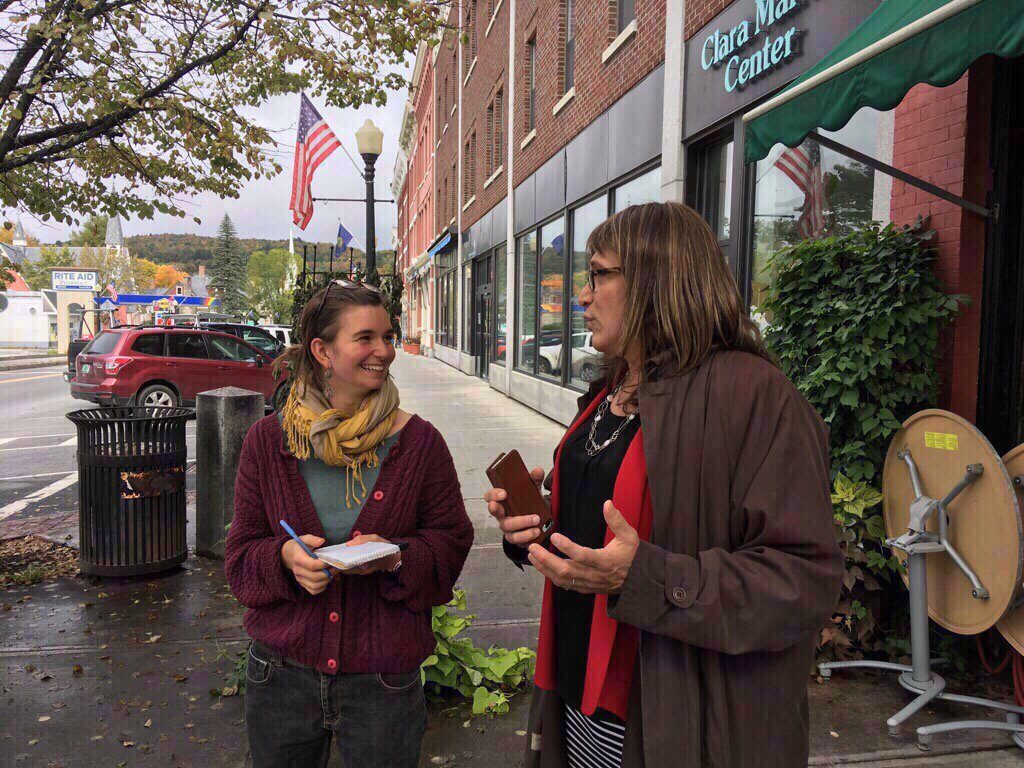
Vermont gubernatorial candidate and former electric co-op CEO Christine Hallquist has personal experience with the state’s inferior broadband internet access, especially in rural areas.
After entering the state’s Democratic primary, “we intentionally put our first campaign office in one of the rural towns [Morrisville, population 2,050]. And you get two or three people trying to work off the same broadband, the system collapses on you,” said Hallquist, who resigned as CEO of Vermont Electric Cooperative in March to run for governor.
Slow internet access notwithstanding, Hallquist, 62, won the state’s Democratic nomination in August with more than 40 percent of the vote. She faces Republican Gov. Phil Scott, who is seeking a second term, in November.
“We’re going to grow jobs and raise wages in rural Vermont” is the Hallquist campaign’s key message, and high-speed internet access is the ticket. Her platform also supports Medicare for all and free tuition at state colleges and vocational schools.
In an interview, Hallquist described how her 12 years at Vermont Electric Cooperative as CEO gave her valuable experience as a leader and advocate for rural America. And she gives a glimpse on how her life has changed since winning the primary.
Q: How was your co-op experience a training ground for political office? What experiences as a co-op leader are you tapping into as you run a campaign?
A: “When you’re a co-op leader, you’re actually working with a functioning democracy because you’re working with elected board members. You learn how to deliver those messages in a way that people can hear them. I’ve been the moderator for town meetings, too, and you learn how to get the best input from folks and understanding the nuances of messaging.
“But one of the best things we have going for us as co-op leaders is that we serve rural America. Two-thirds of Vermonters are rural by USDA definition. And if you look at the problems that we’re experiencing in Vermont, they’re the same problems that all of our NRECA members are experiencing. We know what it’s like to be living on the lower rungs of the economic ladder. We’re looking at increased rates of poverty, we’re seeing flight to the cities, and we’re seeing aging demographics. I know a lot of our cooperatives are struggling with that same problem, and, of course, the root of that problem is the decrease in the number of jobs.”
Hallquist says Vermont won’t grow its economy until every home and business has access to broadband internet service. Her campaign points to co-op success stories in Iowa, Idaho, Minnesota, Missouri and Montana as proof it can be done.
Q: You’ve said that wider access to broadband is crucial for economic growth. Can you talk about that?
A: “I want to connect every home and business in Vermont with fiber-optic cable and rebuild those rural downtowns. Our copper infrastructure is wholly inadequate to meet the needs of a business today. That’s what we’re dealing with in rural America. That’s why we need to connect everybody to fiber. You’re not going to get a young person to move to a rural area if they can’t get connected. My son’s a great example. He’s a documentary filmmaker, and he has to live in Saratoga, New York, three hours away, because we don’t have the connectivity. He was doing his job at home, but as he became more successful, he couldn’t tolerate the low bandwidth. There’s stories like that left and right.
“Vermont is a dairy state, but small dairy farms are dying [and] they’re moving to these big, huge farms. We’ve done an experiment in one of our towns where we have cooperative packaging and processing facilities so that farmers can come and make their own products. It’s been very successful. So I certainly want to expand that throughout the state. But getting connected is a key part of that.”
When Hallquist became CEO at Vermont Electric Co-op in 2005, it was nearly bankrupt and the state was considering pulling its certificate of public good. She worked to rebuild the co-op’s finances, and it’s now on solid financial footing. In addition, the co-op meets 96 percent of its energy needs from carbon-free sources and has not had a rate increase in more than four years.
Q: You were a successful CEO of one Vermont’s largest electric utilities. Why give that up and subject yourself to public scrutiny?
A: “I look at what’s happening in our country and I can’t sit back anymore. I decided I would give up everything in order to get us to become a decent democracy because we are not.
“[On a personal level] we’ve had to make some changes. We do have security that shows up for larger events and we have the state police working with us. I knew we would get the vitriol because that’s the underbelly of ugliness that we’re seeing in our country right now.”
After her primary victory, Hallquist’s campaign saw a boost in contributions—raising roughly the same amount since mid-August as it had over the course of the entire campaign.
Q: Do you see your campaign as being part of a larger wave during this campaign of restless voters wanting a change?
A: “We are part of a wave going on, and here’s what I’m hoping will happen…that 10 years from now we’re going to look back at 2018 and say that’s the year we made history and that we’re all proud of our democracy.
“It adds to the sense of excitement, but still doesn’t change the message: Vermonters are going to elect me for what I’m going to do for Vermont.”
Victoria A. Rocha is a staff writer at NRECA.